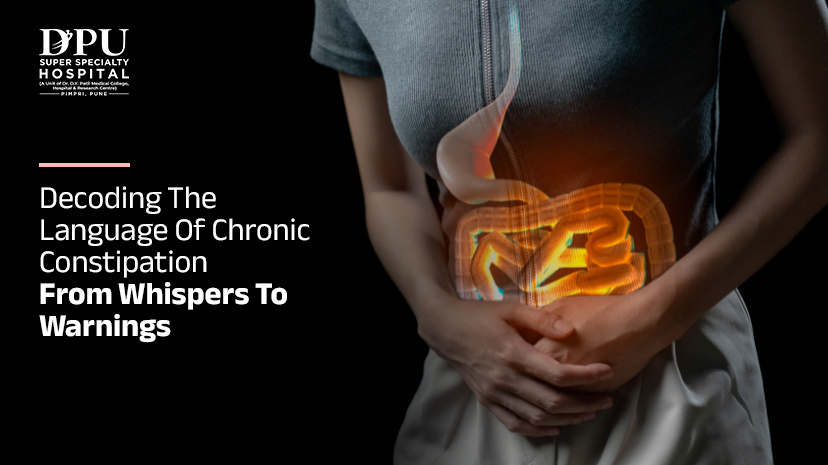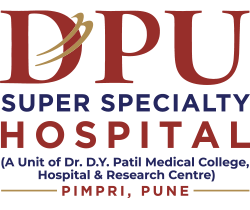Decoding The Language Of Chronic Constipation From Whispers To Warnings

In today's lifestyle, we often overlook subtle signs from our bodies, and one such signal is chronic constipation. While it might seem like a minor inconvenience, chronic constipation is a discreet messenger, quietly indicating potential underlying health concerns.
Delve into this blog to uncover the intricate connections between constipation and its potential associations with health conditions like irritable bowel syndrome (IBS), diabetes, and hypothyroidism.
Understanding these links becomes pivotal for proactive health management and well-informed well-being.
The silent struggle of chronic constipation
Constipation is more than an occasional inconvenience; it's a persistent and silent struggle that affects most of the Indian population.
Understand the symptoms, causes, and impact it can have on your overall well-being. It's high time we acknowledge that digestive health is integral to our lives. Thus, it becomes crucial to understand the signs such as:
- Fewer bowel movements per week
- Dry or hard stool
- Bloating, stomach ache
- Decreased appetite
Causes of constipation:
Understanding the digestive system's nuances helps unravel the causes of constipation. When the colon absorbs excess water from waste, it leads to dry and hard stools.
Lifestyle factors, medication side effects, and underlying medical conditions can contribute to this imbalance.
Lifestyle Causes:
Our daily choices play a pivotal role in digestive health. Stress, low-fiber diets, immobility, and inadequate water intake can contribute to constipation. Even resisting the urge to have a bowel movement can disrupt the natural flow.
Medications and Supplements:
While medications aim to heal, some may inadvertently cause constipation. Antidepressants, Antacids, certain blood pressure drugs, and pain medications are potential culprits.
To prevent suffering from chronic constipation, consulting with your doctor is advisable here.
Medical Conditions:
In the realm of health, constipation can often be a sign of more complex issues like endocrine problems, neurological disorders, colorectal cancer, and irritable bowel syndrome (IBS).
Identifying these underlying medical conditions is paramount for their effective management. By understanding the signals our bodies send, we equip ourselves for a proactive approach to healthcare.
When should you visit the doctor?
Seek relief before it becomes a health emergency. Ignored constipation can pave the way for severe troubles like hemorrhoids, anal fissures, rectal prolapse, and more.
Rush to urgent care if you encounter:
- Intense stomach pain or discomfort during bowel movements
- Unexpected appearance of blood in your stool
- Unexplained weight loss
- Difficulty in having a bowel movement
- Persistent constipation lasting over three weeks
- Uncomfortable and significant bloating
- Haemorrhoids (Piles)
Chronic constipation is closely associated with Haemorrhoids, also known as Piles. Straining to pass stool during bowel movements can cause the veins in the lower rectum to swell. These swollen veins are known as Piles. - Bowel incontinence
Chronic constipation signals a potential concern: Bowel incontinence, a condition where the muscles in the rectum and intestines weaken due to overstretching. This weakening leads to watery stool bypassing the impacted stool and causing involuntary soiling.
Understanding and addressing these nuances is crucial for maintaining digestive well-being. Seek professional guidance to navigate this intricate aspect of your health effectively. - Fecal impaction
Fecal impaction is the result of chronic constipation. It is a situation when you're unable to pass poop (stool or feces) regularly, and the stool backs up in the large intestine (colon).
Your inability to sense and respond to the presence of stool in your rectum is caused by Fecal impaction.
Breaking the Stigma- Let’s Open Conversations for Better Health
Often dismissed or neglected, constipation carries an unwarranted social stigma that can hinder individuals from seeking help or discussing their symptoms openly.
To counter this, there needs to be a collective effort to normalise conversations around digestive health. Encouraging open dialogue, providing accurate information, and promoting awareness about the prevalence of constipation will contribute to breaking the stigma.
Fostering a supportive atmosphere for open dialogue about health concerns can lead to better understanding, timely interventions, and improved overall health outcomes.
Preventing constipation comes in various forms, from addressing irregular or mild cases with home remedies to seeking medication for more chronic conditions.
By creating awareness and encouraging discussions, we empower individuals to take charge of their digestive health for a more comfortable and resilient well-being
Combat constipation with simple home remedies
- Make dietary changes by including a diet with a fresh infusion of fruits, vegetables, cereals, prunes, bran, and whole grains. Bid farewell to high-fat meat, cheese, and eggs.
- Boost your hydration game by adding a few extra glasses of water each day while curbing alcohol and caffeine intake. It's a practical approach to alleviate constipation and foster digestive wellness, ensuring a smoother journey to overall health.
- Keep your body moving with regular exercise, and consider adjusting your toilet posture for smoother bowel movements.
- Don't forget, avoid prolonged straining, and limit your time on the toilet—keep distractions like phones and books out of the bathroom for a more focused relief.
Conclusion:
Chronic Constipation is like an underlying issue connected to various severe diseases. By unravelling this connection, we empower individuals to become advocates for their digestive well-being.
Acknowledging the signs and interpreting our body's signals is crucial. If you're encountering any of the symptoms discussed, it's prudent to seek assistance from one of India's best gastroenterology hospitals – DPU Private Super Specialty Hospital in Pimpri, Pune.
Our commitment to digestive health and cutting-edge medical expertise ensure that you receive top-notch care and personalised attention. Don't hesitate; to make a proactive choice for your well-being by choosing DPU Private Super Specialty Hospital for all your gastroenterological needs.
Embarking on a path to improved well-being starts by listening to the whispers of our bodies.









